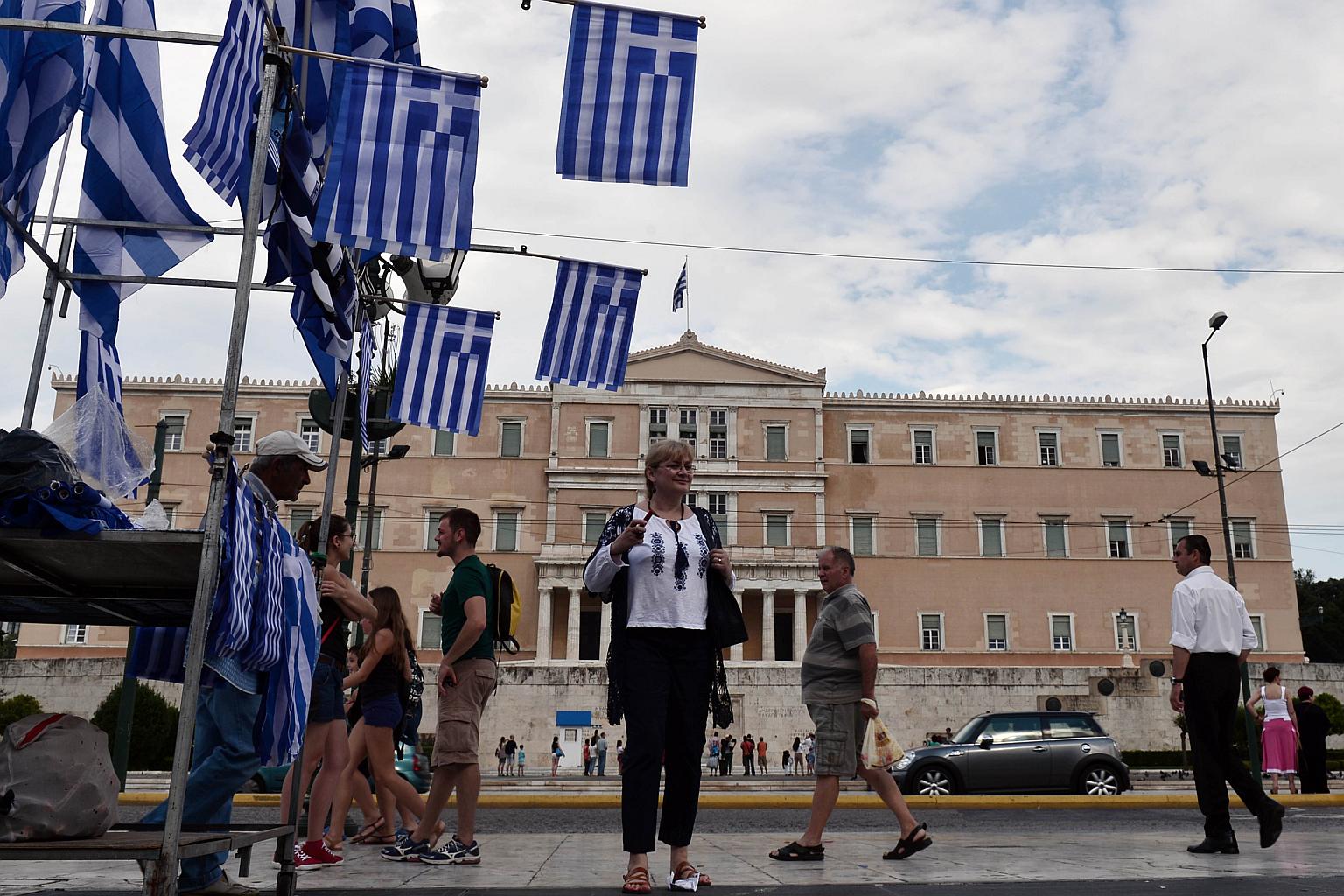Greece imposes capital controls: What does this actually mean?
Sign up now: Get ST's newsletters delivered to your inbox

A street vendor selling greek flags in front of the Greek parliamnet in Athens.
PHOTO: AFP
Greece shut its banks and imposed capital controls in a dead-of-night announcement on Sunday designed to avert the collapse of its financial system as the country edges closer to a debt default and an exit from the 19-member eurozone.
The move follows the breakdown of aid talks with international creditors late Friday and a European Central Bank decision not to increase its lifeline of emergency funding to Greek lenders, despite early signs of a chaotic bank run.
Greece is only the second eurozone country, after Cyprus in 2013, to impose capital controls.
Here's 5 things you should know:
1. What are the controls on capital?
A capital control is when the government tells you that you are no longer allowed to move your money around freely.
Greek banks to stay shut until at least July 6.
Cash withdrawals from ATMs will be limited to €60 (S$89.50) a day for this period.
Overseas transfers of cash prohibited, except for vital, pre-approved commercial transactions.
Foreign tourists, a vital engine of the Greek economy, will be exempt from the restrictions,
2. Why impose capital controls?
The measures are aimed at preventing euros flowing out of Greek banks - to overseas banks, into a different currency, or to be stashed under the mattress.
More than a third of ATMs across Greece ran out of cash on Saturday before they were replenished. Since Friday night alone, 1.3 billion euros (S$1.94 billion) have been withdrawn from the Greek banking system, according to the head of the bank workers' union Stavros Koukos.
3. How long can capital controls last?
Capital controls are usually imposed to ward off panic selling or withdrawals and buy time for governments to tackle the crisis. The assumption is that once the economic dust has settled, the panic withdrawals will end, and the controls can be lifted again.
The longer they are in place however, the greater effect they have on an economy.
In Greece's case, the goverment says the controls will last at least until July 6 - the day after Greek citizens vote yes or no to creditors' bailout proposals. Prime Minister Alexis Tsipras unexpectedly call for this July 5 referendum after talks with creditors collapsed.
How long after June 6 could all depend on whether Greece defaults and/or exits the eurozone.
In Cyprus, which faced a banking crisis, controls were only lifted in April 2015, after more than two years.
Malaysia imposed capital controls in September 1998 in the midst of the Asian financial crisis, lifing them fully a year later.
4. What will be the economic fallout?
Greek people will have less money to spend and business less to invest; so an already weak economy will probably return to deep recession.
"The Greek economy, already at standstill, will go to deep freeze," Nicholas Economides, a professor at New York University's Stern School of Business, told Bloomberg News.
The fallout could spread to other weaker eurozone economies as investors wonder if their money will be safe there.
5. Are the controls legal?
The European Commission on Monday gave its legal blessing to Greece's imposition of capital controls, saying Athens appeared justified in breaching EU laws on free capital movement in order to protect its banks.
Said Financial Services Commission Jonathan Hill in a statement: "Maintaining financial stability is the main and immediate challenge for the country. While the imposed restrictive measures appear necessary and proportionate at this time, the free movement of capital will however need to be reinstated as soon as possible in the interest of the Greek economy, the euro zone, and the European Union's single market as a whole."
Sources: BBC, Bloomberg, Reuters, AFP

